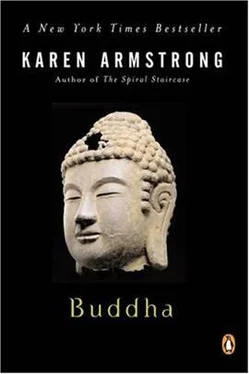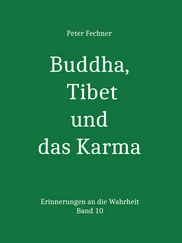When Devadatta published his five rules and asked the Buddha to make them obligatory for the whole Sangha, the Buddha refused, pointing out that any monk who wished to live in this way was perfectly free to do so, but that coercion in these matters was against the spirit of the Order. Monks must make up their own minds and not be forced to follow anybody else’s directives. Devadatta was jubilant. The Buddha had refused his pious request! He announced triumphantly to his followers that the Buddha was given over to luxury and self-indulgence and that it was their duty to withdraw from their corrupt brethren. With five hundred young monks, Devadatta decamped to Gayasisa Hill outside Rajagaha, while the Buddha dispatched Sariputta and Moggallana to win the rebellious bhikkhus back. When Devadatta saw them approaching, he immediately assumed that they had deserted the Buddha and come to join him. Elated, he called an assembly and addressed his disciples far into the night. Then, pleading that his back was paining him, he retired to bed, handing the floor to Sariputta and Moggallana. Once these two loyal elders began to speak, they were soon able to persuade the bhikkhus to return to the Buddha, who received them back without reprisals. Some texts tell us that Devadatta committed suicide; others that he died before he was able to be reconciled with the Buddha. Whatever the truth of these stories, they make a telling point about the suffering of old age; they also form a cautionary tale. Even the Sangha was not immune to the selfishness, ambition and dissension that was so rampant in public life.
The Buddha reflected on this danger in the last year of his life. He was now eighty years old. King Ajatasattu was by this time firmly established on the throne of Magadha and frequently visited the Buddha. He was planning an offensive against the republics of Malla, Videha, Licchavi, Koliya and Vajji, all to the east of his kingdom, who had formed a defensive confederacy known collectively as “the Vajjians.” The king was determined to wipe them off the map and absorb them into his kingdom, but before he launched his attack, he sent his minister Vassakara, a brahmin , to tell the Buddha what he was about to do and to listen carefully to his comments. The Buddha was cryptic. He told Vassakara that as long as the Vajjians remained true to the republican traditions; held “frequent and well-attended meetings”; lived together in concord; respected the older men, listening carefully to their advice; and observed the laws and pieties of their ancestors, King Ajatasattu would not be able to defeat them. Vassakara listened attentively and told the Buddha that, since the Vajjians at present met all these conditions, they were in fact impregnable. He went back to break the news to the king. Buddhist tradition, however, has it that shortly after this, King Ajatasattu did manage to defeat the Vajjians: he achieved this feat by sending spies into the republics to sow discord among the leaders. So there was a poignancy and urgency in the Buddha’s next words, after the door had closed behind Vassakara. He applied the same conditions to the Sangha: as long as its members respected the senior bhikkhus, held frequent assemblies, and remained absolutely true to the Dhamma, the Sangha would survive.
The tribal republics were doomed. They belonged to the past and would shortly be swept away by the new militant monarchies. King Pasenedi’s son would soon defeat and massacre the Sakyans, the Buddha’s own people. But the Buddha’s Sangha was a new, up-to-date, and spiritually skillful version of the old republican governments. It would hold true to values that the more violent and coercive monarchies were in danger of forgetting. But this was a dangerous world. The Sangha could not survive the internal dissension, disrespect for elders, lack of loving-kindness, and superficiality that had surfaced during the Devadatta scandal. Bhikkhus and bhikkhunis must be mindful, spiritually alert, energetic and faithful to the meditative disciplines that alone could bring them enlightenment. The Order would not decline as long as monks avoided such unskillful pursuits as “gossiping, lazing around, and socializing; as long as they have no unprincipled friends and avoid falling under such people’s spell; as long as they do not stop halfway in their quest and remain satisfied with a mediocre level of spirituality.” If they failed in this, the Sangha would become indistinguishable from any secular institution; it would fall prey to the vices of the monarchies and become hopelessly corrupt.
After the meeting with Vassakara, the Buddha decided to leave Rajagaha and travel north in order to spend the vassa retreat in Vesall. It is as though the revelation of King Ajatasattu’s plans to “exterminate and destroy” the Vajjians had momentarily repelled him and made him aware of the affinity he felt for the beleaguered republics. He had spent most of his working life in Kosala and Maghada and had fulfilled an important mission there. But now, an old man who had himself suffered from the aggression that fueled the political life of these kingdoms, he headed out into the more marginal regions of the Ganges basin.
Slowly, with a large entourage of monks, the Buddha journeyed through Magadhan territory, first to Nalanda and then to Pataligama (the modern Patna), later the capital of the great Buddhist king Asoka(c. 269-232 b.c.e.), who would create a monarchy that eschewed violence and tried to embody the compassionate ethic of the Dhamma. The Buddha noticed the great fortresses that were being built by the Magadhan ministers in preparation for the coming war with the Vajjians, and prophesied the city’s future greatness. There a delegation of lay disciples put a rest house at the Buddha’s disposal, laying down carpets and hanging a great oil lamp, and the Buddha sat up all night preaching the version of the Dhamma that had been adapted to the needs of the laity. He pointed out that the prudence of skillful behavior could benefit a virtuous man or woman even in this world, and would ensure that in their next lives they would be farther along the route to enlightenment.
Finally, the Buddha arrived at Vesall. At first everything seemed as it had always been. He lodged in a mango grove belonging to Ambapali, one of the town’s leading courtesans. She came out to greet the Buddha with a fleet of state carriages, sat at his feet to listen to the Dhamma, and invited him to dine. Just as he had given his consent, the members of the Licchavi tribe who were living in Vesall sallied forth in a body to invite the Buddha themselves, riding in a splendid procession of brilliantly colored carriages. It was a marvelous sight, and the Buddha smiled when he saw it, telling his bhikkhus that now they had some idea of the magnificence of the gods in heaven. The Licchavis sat around the Buddha, who “spurred them on, inspired and encouraged” them with talk of the Dhamma. At the end of this discourse, the Licchavis issued their invitation to dinner, and when the Buddha told them that he was already engaged to eat with Ambapali, they did I not lose their good humor, but snapped their fingers, crying I “Oh the mango girl has beaten us, the mango girl has outwitted us!” That night, at dinner, the courtesan donated the mango grove to the Sangha, and the Buddha stayed for a while there, preaching to his bhikkhus. There was the usual bustle, glamour and excitement around the Buddha and, at its heart, the constant exhortation to an intense interior life of mindfulness and meditation.
But then the picture began to darken. The Buddha left Vesali with his monks and took up residence in the nearby village of Beluvagamaka. After they had stayed there a while, he suddenly dismissed his monks: they should go back to Vesali and put up for the monsoon retreat wherever they could. He and Ananda would stay on in Beluvagamaka. A new solitude had entered the Buddha’s life, and from this point he seemed to shun the larger cities and towns and to seek out ever more obscure locations. It was as though he were already beginning to leave the world. After the bhikkhus had left, the Buddha became seriously ill, but with great self-control he suppressed the pain and overcame his sickness. It was not right for him to die yet and attain the Ultimate Nibbana ( parinibbana ) , which would complete the enlightenment he had won under the bodhi tree. First he must bid the Sangha farewell. The Buddha, therefore, recovered, left his sickroom, and came out to sit with Ananda on the porch of the hut in which he was staying. His illness had shaken Ananda to the core. “I am used to seeing the Blessed One healthy and fit,” he told the Buddha tremulously as he sat down beside him. For the first time he had realized that his master could die. “I felt my body go rigid,” he said, “I could not see straight, my mind was confused.” But he had found comfort in one thought: the Buddha would not die until he had made some practical arrangements about the succession and the government of the Sangha, which would have to change once the master had departed. The Buddha sighed. “What does the Sangha expect of me, Ananda?” he asked patiently. The bhikkhus all knew everything he had to teach them. There was no secret doctrine for a few chosen leaders. Such thoughts as “I must govern the Sangha” or “The Sangha depends on me” did not occur to an enlightened man. “I am an old man, Ananda, eighty years old,” the Buddha went on inexorably. “My body can only get about with the help of makeshifts, like an old cart.” The one activity that brought him ease and refreshment was meditation, which introduced him to the peace and release of Nibbana. And so it must be for every single bhikkhu and bhikkhuil. “Each of you must make himself his island, make himself and no one else his refuge.” No Buddhist could depend upon another person and need one of their number to lead the Order. “The Dhamma-and the Dhamma alone-was his refuge.” How could the bhikkhus become self-reliant? They knew the answer already: by meditation, concentration, mindfulness and a disciplined detachment from the world. The Sangha needed no one to govern it, no central authority. The whole point of the Buddhist lifestyle was to achieve an inner resource that made such dependence quite ludicrous.
Читать дальше












